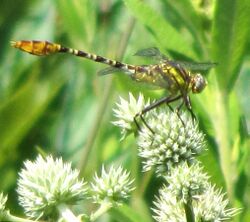Biology:Dromogomphus spoliatus
From HandWiki
Short description: Species of dragonfly
| Dromogomphus spoliatus | |
|---|---|

| |
| Scientific classification | |
| Domain: | Eukaryota |
| Kingdom: | Animalia |
| Phylum: | Arthropoda |
| Class: | Insecta |
| Order: | Odonata |
| Infraorder: | Anisoptera |
| Family: | Gomphidae |
| Genus: | Dromogomphus |
| Species: | D. spoliatus
|
| Binomial name | |
| Dromogomphus spoliatus (Hagen in Selys, 1858)
| |
Dromogomphus spoliatus, the flag-tailed spinyleg, is a species of clubtail in the dragonfly family Gomphidae. It is found in North America.[2][3][1][4]
The IUCN conservation status of Dromogomphus spoliatus is "LC", least concern, with no immediate threat to the species' survival. The population is stable. The IUCN status was reviewed in 2017.[1][5][6]
References
- ↑ Jump up to: 1.0 1.1 1.2 Paulson, D.R. (2017). "Dromogomphus spoliatus". IUCN Red List of Threatened Species 2017: e.T51178659A65836379. doi:10.2305/IUCN.UK.2017-3.RLTS.T51178659A65836379.en. https://www.iucnredlist.org/species/51178659/65836379. Retrieved 11 November 2021.
- ↑ "Dromogomphus spoliatus". Integrated Taxonomic Information System. https://www.itis.gov/servlet/SingleRpt/SingleRpt?search_topic=TSN&search_value=101733. Retrieved 2019-09-23.
- ↑ "Dromogomphus spoliatus". Species. GBIF. http://www.gbif.org/species/1426436.
- ↑ "Dromogomphus spoliatus species Information". https://bugguide.net/node/view/21466. Retrieved 2019-09-23.
- ↑ "Odonata Central". https://www.odonatacentral.org/. Retrieved 2019-07-02.
- ↑ "World Odonata List". Slater Museum of Natural History, University of Puget Sound. 2018. https://www.pugetsound.edu/academics/academic-resources/slater-museum/biodiversity-resources/dragonflies/world-odonata-list2/. Retrieved 2019-07-02.
Further reading
- Kalkman, V. J. (2013). Studies on phylogeny and biogeography of damselflies (Odonata) with emphasis on the Argiolestidae (PhD). Leiden University. hdl:1887/22953.
External links
Wikidata ☰ Q3147821 entry
 |


